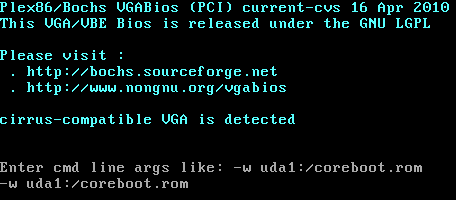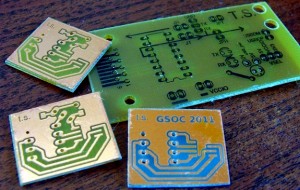Although the GSOC 2010 is closed, my patch about coreboot kconfig which involving the payload kconfig is send to the mail list. There are only two payload are supported.”Filo and coreinfo”. I can add more, but i would like to wait a moment. Because the most important of my project is not how hard it is but how to make the users can use it easily. There are also some consideration should be discussed with the others.
The latest patch which i send now support:
1. use coreboot to load the payload’s kconfig. This feature can be used by “make config PAYLOAD=filo” or “make config PAYLOAD=coreinfo”. Coreboot users can use the coreboot as before too. just “make config” and “make” to manually put payload.elf under coreboot directory. The new method will do all of these things automatically. The method which i use is let the coreboot kconfig detect the macro PAYLOAD, if the variable matches filo/coreinfo, it would load the filo/coreinfo kconfig. It also disable the coreboot kconfig’s payload menu which could avoid conflict.
there is a consideration which should be discussed. There is an sinario,the libpayload may be modified between “make config” and “make”. I did not take this into consideration, because it can be avoid by “make clean” to rebuild the project. If anyone thought it’s improper, please let me know.
2. Most of the payload are using libpayload. Libpayload should be installed to certain path to make sure payload can be compiling correctly. The previous patch which i send are using to let payload can load libpayload automatically, it can configure the libpayload each time. Like enable USB features or not. It’s pretty easy to build the payload. the whole things can be worked as one.
I also posted an new patch about filo to use an new method to do these things. The previous method is trying to use filo’s kconfig program to load libpayload config files. Lots of messages are show the same with filo while filo configuring libpayload. The new patch use a remote method which invoke libpayload’s own kconfig program to buid itself. The patch also looks simpler that previous.
The time is passed much quick. But i learned much about the open source. I reviewed the goals of GSOC
Google Summer of Code has several goals:
- Create and release open source code for the benefit of all
- Inspire young developers to begin participating in open source development
- Help open source projects identify and bring in new developers and committers
- Provide students the opportunity to do work related to their academic pursuits during the summer (think “flip bits, not burgers”)
- Give students more exposure to real-world software development scenarios (e.g., distributed development, software licensing questions, mailing-list etiquette)
I am so glad that i can join the open source family before graduation. Coreboot is a wonderful project, from here I can learn much about the X86 systems, firmware things. I also should spend lots of time to learn them. One of my experience is that real-world software should thinking every possibility not only the realization of features. Marc always told me: thinking about all of the corner cases. That helps a lot. Thanks to google give me this opportunity to join in Coreboot. Thanks to my mentor Marc, he is a very nice man who knows everything that i want to know He tells me how to join an open source project, how to do real software programming, how to considerate the software. Thanks to QingPei, who helps me a lot during the whole process. He also tells me that: “GSOC is an opportunity to teach new developers rather than a chance to get a pile of free code. It’s a big step for me to learn how to contribute to coreboot. So no matter my last evaluation is passed or not. I will try to do all of these things.
By the way, Any ideas about the coreboot kconfig things is welcome.
There are also some questions that should be completed:
1) What was the final outcome of your project?
well, i am not sure about this. I think i am good, i learned how does coreboot work, how wonderful it is. Although patches are still pending. But the patch is the best way i can realize the feature with my ability.
2) What problems did you encounter and how did you work through them?
The problems which i can not forget is it’s much more hard than i had ever think about low level things. At the beginning, it’s only seems wonderful for me, Coreboot did the all of the legacy system bios things. But after several weeks, i found that the coreboot developer are all genius, it’s too hard to understand the who things. Fortunately i at least know how does coreboot work, i know lots of things that i can not learn from class. i used to call QingPei for 3 hours to let him tell me what’s the coreboot things going on.
3) What did you learn about open source development?
Lots of them, there are two parts. First, the real project programming skills. At least i can read most of the Makefile and understand how does these things doing. I also know pretty much about Kconfig language. By the way, i also learned much about “Bash” “Sed” programming. I learned how to work with linux gcc.there are something more i can not write down one by one. Second, i finally can join an open source project, i knew how does the large open source project are working. It need “singed-off-by” and “ack-by” before checking in the code. the build service will show interesting messaging if there is any error between the building progress.
4) Do you plan to work on other open source projects? Which ones?
Because there are also lots of thing should be done with the coreboot kconfig things. I would like to still my work with coreboot, i hope i can contribute more for coreboot.
5) What did you learn about coreboot?
Pretty much. As i said in question 3.
6) Do you plan to develop or use coreboot in the future?
Sure, i will.
7) What could coreboot do better to help developers in the future?
More manuals for the new developers? Although i thinks the wiki is good enough. If there is more manuals, it will be better.
8) Would you recommend coreboot GSoC to other students?
I will, but i should check if he is smart enough.
9) Do you feel that you passed or failed your GSoC project?
I do not know, it does not matter, as least i learn pretty much more thank i thought.
Thanks to Google
Thanks to Coreboot
Thanks to Marc Jones
Thanks to Wang Qing Pei



